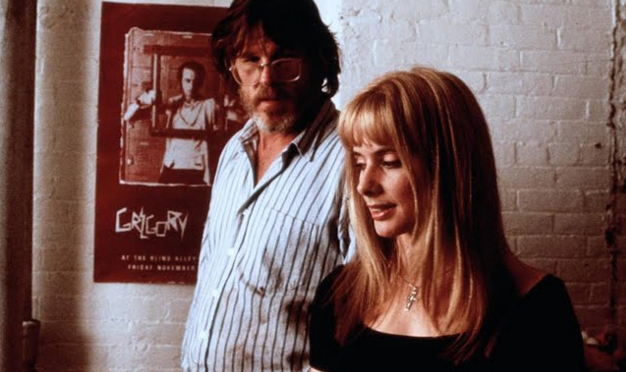They say New York is the city of constant change, but looking back on 1989’s trilogy film, New York Stories, it’s pretty clear that the more things change, the more they stay the same. In each of three narratives, directed, respectively, by Martin Scorsese, Francis Ford Coppola and Woody Allen, an archetype of, for all intents and purposes, a douche bag is revealed.
Scorsese’s vignette, Life Lessons, offers the objective best of the lot, with Nick Nolte in the role of an egotistical painter named Lionel Dobie living in a giant SoHo loft where he creates his masterpieces. Lionel’s infatuation with his “assistant”/former lover, Paulette (Rosanna Arquette, who always proves a shining diamond in any Scorsese movie, i.e. After Hours), leads him to maddening frustration that can only be channeled through his art. Her insistence on not wanting to be with him romantically, but rather, actually learning something from his wisdom as an artist proves to be a torture for Lionel, especially when he finds out that she’s been seeing a performance artist du jour named Gregory Stark (Steve Buscemi).
When she threatens to leave New York to go back home, he goads her, “What are you gonna do, build a little studio in your parents’ garage?” Able to convince her that she needs to stay in the city if she really wants to be a “serious” artist, Paulette demands to know if she has any real talent. As always, Lionel dodges the question by giving her vague encouragements without actually saying anything, including, “It’s art. You give it up, you were never an artist in the first place.” Incensed by his blow-hardery, Paulette takes advantage of all the gallery openings he can get her into and flirts openly with men so as to iterate she’s repulsed by Lionel. The jealousy Lionel feels serves as a boon to his creativity, which only makes it more evident to Paulette that he’s using her, leading her on in the worst possible way by making her believe she could ever break into the art world with her work. In the end, Paulette does move back home, leaving Lionel to prey on yet another ingenue at one of his exhibits. And so, the cycle of sex as a commodity in the art world persists.
Francis Ford Coppola’s Life Without Zoë may be the least enjoyable endeavor of the film, but it does recount the tale of a common character in New York, that of the rich Upper West/East Side child left to her own devices. Zoë (Heather McComb) is, naturally, a precocious girl whose parents, Charlotte (Talia Shire) and Claudio (Giancarlo Giannini), are constantly traveling due to their artistic careers–Charlotte is an author, Claudio is a flautist. Because of this Zoë has an extremely skewed view of reality, augmented by the fellow affluent children she hangs out with from her school. Co-written with Sofia Coppola, it’s possible that Francis Ford thought he might create a certain authenticity pertaining to the father-daughter relationship by collaborating with her, but instead, Life Without Zoë merely solidifies the perception people have of wealthy New York parents and their spawn: that they’re utter self-involved twats living in an alternate version of the city that very few others could ever enjoy.
The final piece in New York Stories is a fitting conclusion to pay homage to one of the most populous Jewish communities on earth. Oedipus Wrecks, written and directed by Woody Allen, follows nebbish, pussy-whipped-by-his-mother Sheldon (Allen) as he details the travails of enduring his matriarch’s overbearing ways to his therapist. When she introduces her to his finacée, Lisa (Mia Farrow), she embarrasses him to no end with stories, photos and general aggravation. Although his mother acts nice enough to Lisa, she disapproves of Sheldon marrying a shiksa with three kids from a previous relationship. When they all attend a magic show together, Lisa’s children included, his mother is called to the stage where she disappears literally after the trick, harkening back to an earlier statement Sheldon made to his therapist, “I love her, but I wish she would just disappear.” After the show, a brief panic ensues, with the owner of the club (Larry David with a Sideshow Bob-esque haircut) expressing just a hint more concern than Sheldon over her vanishing–mainly because he doesn’t want to be sued.
As time goes on, Sheldon gets used to her absence and relishes it, feeling a freedom he had never thus far known before. But letting down his guard proves to be a mistake when his mother reappears in the New York City skyline, airing all of his business to the denizens like a human foghorn. Months pass this way, with Sheldon’s humiliation growing worse every day. Finally, his therapist refers him to a psychic named Treva (Julie Kavner, pre-Marge fame). Treva’s similarities to his mother are subtle, yet overt enough for Sheldon to notice them. His attraction to her is well-timed as Lisa decides to walk out on him and leave the city in shame over his mother’s constant insults toward her. When his mother sees that Sheldon is with a nice Jewish girl very much modeled after her own character, she descends from the sky and returns to that otherworldly place we call New York, a city in constant flux that always seems to produce or allure the same type of people.





















